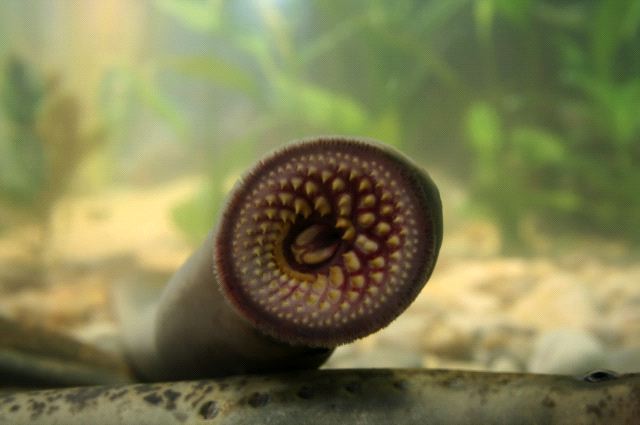Jawless fish
Agnathans, or jawless fish, appeared in Early Cambrian time and ruled the seas until the Silurian Period.
 (28 kb) From the Greek a (without), and gnathos (jaw), the name illustrates their primitive character. Without a moveable jointed jaw, the mouth consisted of an opening lined with a few muscles. The term agnathan unites several groups that do not necessarily have a common ancestry. For convenience, this grouping combines animals that do not belong to the more closely linked group, the gnathostomes (jawed animals).
(28 kb) From the Greek a (without), and gnathos (jaw), the name illustrates their primitive character. Without a moveable jointed jaw, the mouth consisted of an opening lined with a few muscles. The term agnathan unites several groups that do not necessarily have a common ancestry. For convenience, this grouping combines animals that do not belong to the more closely linked group, the gnathostomes (jawed animals).
In all, there were nine main groups of agnathan fish: the myxinids and petromyzontids, still represented today by hagfish and lampreys, and the arandaspids, heterostracans, galeaspids, pituriaspids, anaspids, thelodonts and osteostracans, all now extinct.
Some classify the enigmatic euconodonts among the agnathans. The tiny denticles of these animals are found by the thousands in sediments dating from the Middle Cambrian to the Upper Triassic. But, despite the abundance of these soft-bodied animals in marine environments, they left only rare traces of their anatomy. It is from specimens in Scotland (Carboniferous) and South Africa (Ordovician) that paleontologists have been able to deduce that euconodonts were spindly animals with V-shaped muscles and an assemblage of denticles in the head region. The histological structure of these miniature “teeth” is reminiscent of vertebrate bones.
The four genera of agnathans found at Miguasha are divided between two large groups: anaspids and osteostracans. These groups did not survive the extinction at the end of the Devonian and the ancient estuary of Miguasha seems to have been their final refuge. Fragile creatures, agnathans are relatively rare in the sediments of the Escuminac Formation, and the discovery of each new specimen teaches us a little more about the anatomy of the last species of these groups.

 (28 kb) From the Greek a (without), and gnathos (jaw), the name illustrates their primitive character. Without a moveable jointed jaw, the mouth consisted of an opening lined with a few muscles. The term agnathan unites several groups that do not necessarily have a common ancestry. For convenience, this grouping combines animals that do not belong to the more closely linked group, the gnathostomes (jawed animals).
(28 kb) From the Greek a (without), and gnathos (jaw), the name illustrates their primitive character. Without a moveable jointed jaw, the mouth consisted of an opening lined with a few muscles. The term agnathan unites several groups that do not necessarily have a common ancestry. For convenience, this grouping combines animals that do not belong to the more closely linked group, the gnathostomes (jawed animals).In all, there were nine main groups of agnathan fish: the myxinids and petromyzontids, still represented today by hagfish and lampreys, and the arandaspids, heterostracans, galeaspids, pituriaspids, anaspids, thelodonts and osteostracans, all now extinct.
Some classify the enigmatic euconodonts among the agnathans. The tiny denticles of these animals are found by the thousands in sediments dating from the Middle Cambrian to the Upper Triassic. But, despite the abundance of these soft-bodied animals in marine environments, they left only rare traces of their anatomy. It is from specimens in Scotland (Carboniferous) and South Africa (Ordovician) that paleontologists have been able to deduce that euconodonts were spindly animals with V-shaped muscles and an assemblage of denticles in the head region. The histological structure of these miniature “teeth” is reminiscent of vertebrate bones.
The four genera of agnathans found at Miguasha are divided between two large groups: anaspids and osteostracans. These groups did not survive the extinction at the end of the Devonian and the ancient estuary of Miguasha seems to have been their final refuge. Fragile creatures, agnathans are relatively rare in the sediments of the Escuminac Formation, and the discovery of each new specimen teaches us a little more about the anatomy of the last species of these groups.
Site map | Feedback | Links | Sources | Credits
Jawless fish
<< Vertebrates | Anaspids >>

Title: Modern lamprey
Author: David Pedre
Sources: Istockphoto
Year: 2007
Description:
The lampreys, along with the hagfish (myxines), are the only surviving members of the ancient but diversified group of jawless fish. The number of small hooks that line its circular mouth allowed it to attach itself to its host.


